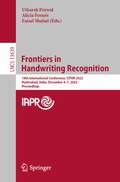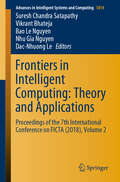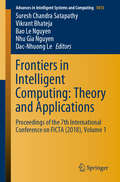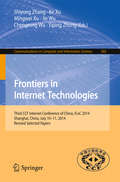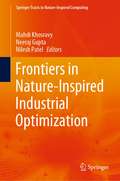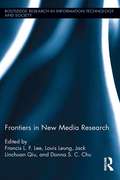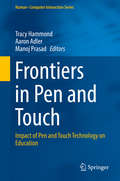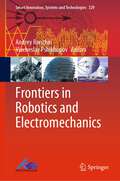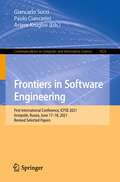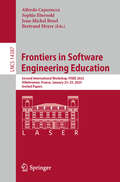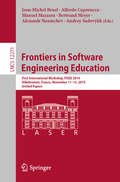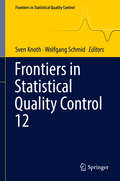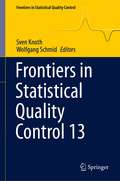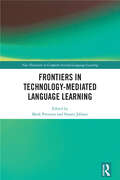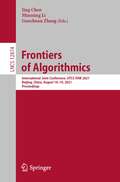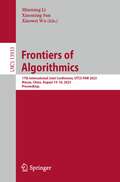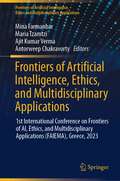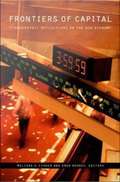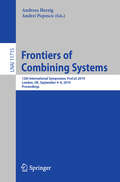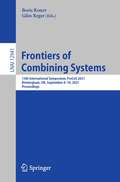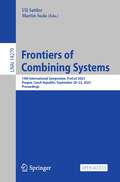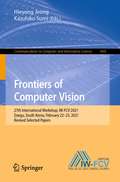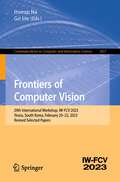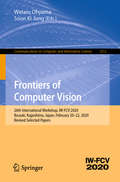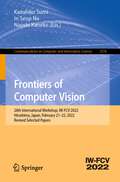- Table View
- List View
Frontiers in Handwriting Recognition: 18th International Conference, ICFHR 2022, Hyderabad, India, December 4–7, 2022, Proceedings (Lecture Notes in Computer Science #13639)
by Utkarsh Porwal Alicia Fornés Faisal ShafaitThis book constitutes the refereed proceedings of the 18th International Conference on Frontiers in Handwriting Recognition, ICFHR 2022, which took place in Hyderabad, India, during December 4-7, 2022.The 36 full papers and 1 short paper presented in this volume were carefully reviewed and selected from 61 submissions. The contributions were organized in topical sections as follows: Historical Document Processing; Signature Verification and Writer Identification; Symbol and Graphics Recognition; Handwriting Recognition and Understanding; Handwriting Datasets and Synthetic Handwriting Generation; Document Analysis and Processing.
Frontiers in Intelligent Computing: Proceedings of the 7th International Conference on FICTA (2018), Volume 2 (Advances in Intelligent Systems and Computing #1014)
by Suresh Chandra Satapathy Vikrant Bhateja Bao Le Nguyen Nhu Gia Nguyen Dac-Nhuong LeThis book presents the proceedings of the 7th International Conference on Frontiers of Intelligent Computing: Theory and Applications (FICTA 2018), held at Duy Tan University, Da Nang, Vietnam. The event brought together researchers, scientists, engineers, and practitioners to exchange ideas and experiences in the domain of intelligent computing theories with prospective applications in various engineering disciplines. These proceedings are divided into two volumes. Covering broad areas of intelligent engineering informatics, with papers exploring both the theoretical and practical aspects of various areas like ANN and genetic algorithms, human–computer interaction, intelligent control optimization, intelligent e-learning systems, machine learning, mobile computing, and multi-agent systems, this volume is a valuable resource for postgraduate students in various engineering disciplines.
Frontiers in Intelligent Computing: Proceedings of the 7th International Conference on FICTA (2018), Volume 1 (Advances in Intelligent Systems and Computing #1013)
by Suresh Chandra Satapathy Vikrant Bhateja Bao Le Nguyen Nhu Gia Nguyen Dac-Nhuong LeThis book presents the proceedings of the 7th International Conference on Frontiers of Intelligent Computing: Theory and Applications (FICTA 2018), held at Duy Tan University, Da Nang, Vietnam. The event brought together researchers, scientists, engineers, and practitioners to exchange new ideas and experiences in the domain of intelligent computing theories with prospective applications in various engineering disciplines. These proceedings are divided into two volumes. Covering broad areas of information and decision sciences, with papers exploring both the theoretical and practical aspects of data-intensive computing, data mining, evolutionary computation, knowledge management and networks, sensor networks, signal processing, wireless networks, protocols and architectures, this volume is a valuable resource for postgraduate students in various engineering disciplines.
Frontiers in Internet Technologies
by Shiyong Zhang Ke Xu Mingwei Xu Jie Wu Chengrong Wu Yiping ZhongThis book constitutes the refereed proceedings of the Third CCF Internet Conference of China, ICoC 2014, held in Shanghai, China, in July 2014. The 10 revised full papers presented were carefully reviewed and selected from 94 submissions. The papers address issues such as software defined network, network security, future Internet architecture, Internet application, network management, network protocols and models, wireless and sensor networks.
Frontiers in Nature-Inspired Industrial Optimization (Springer Tracts in Nature-Inspired Computing)
by Mahdi Khosravy Neeraj Gupta Nilesh PatelThe book provides a collection of recent applications of nature inspired optimization in industrial fields. Different optimization techniques have been deployed, and different problems have been effectively analyzed. The valuable contributions from researchers focus on three ultimate goals (i) improving the accuracy of these techniques, (ii) achieving higher speed and lower computational complexity, and (iii) working on their proposed applications. The book is helpful for active researchers and practitioners in the field.
Frontiers in New Media Research: Frontiers In New Media Research (Routledge Research in Information Technology and Society #15)
by Francis L. F. Lee Louis Leung Jack L. Qiu Donna S. C. ChuThis volume puts together the works of a group of distinguished scholars and active researchers in the field of media and communication studies to reflect upon the past, present, and future of new media research. The chapters examine the implications of new media technologies on everyday life, existing social institutions, and the society at large at various levels of analysis. Macro-level analyses of changing techno-social formation – such as discussions of the rise of surveillance society and the "fifth estate" – are combined with studies on concrete and specific new media phenomena, such as the rise of Pro-Am collaboration and "fan labor" online. In the process, prominent concepts in the field of new media studies, such as social capital, displacement, and convergence, are critically examined, while new theoretical perspectives are proposed and explicated. Reflecting the inter-disciplinary nature of the field of new media studies and communication research in general, the chapters interrogate into the problematic through a range of theoretical and methodological approaches. The book should offer students and researchers who are interested in the social impact of new media both critical reviews of the existing literature and inspirations for developing new research questions.
Frontiers in Pen and Touch
by Tracy Hammond Aaron Adler Manoj PrasadThis inspirational book contains evidence-based research presented by educational scientists, for the advancement of stylus-based technology and its applications for college and K-12 classrooms. Writing and sketching are an important part of teaching and learning, and digital ink technologies enable us to perform these activities in a digital world. Frontiers in Pen and Touch aims to highlight software and hardware practices and innovations, to encourage transformational use of pen and touch in the classroom. The content of the book is derived from the 2016 Conference on Pen and Touch Technology on Education (CPTTE). Chapters written by academic practitioners provide stories of success for ink, including multimedia content creation and increasing student engagement. Industry and academic researchers share their findings and present intelligent systems that enable pen and touch systems to teach and motivate students. This book is a must-read for anyone wanting to harness and integrate pen and touch for improving today's student experiences.
Frontiers in Robotics and Electromechanics (Smart Innovation, Systems and Technologies #329)
by Andrey Ronzhin Viacheslav PshikhopovThis book introduces intellectual control systems and electromechanics of heterogeneous robots. The book uncovers fundamental principles of robot control and recent developments in software and hardware of robots. The book presents solutions and discusses problems of single robotic devices as well as heterogeneous robotic teams while performing technological tasks that require informational, physical or energetic interaction with human users, environment and other robots. The book considers model–algorithmic and software–hardware control of ground, water and underwater robots, unmanned aerial vehicles, as well as their embedded and attached sub-systems, including manipulators, end-effectors, sensors, actuators, etc. The book will be useful for researchers of interdisciplinary issues related to robotics, electromechanics and artificial intelligence. The book is recommended for graduate students with a major/minor in the areas of robotics and mechatronics, management in technical systems, Internet of Things, artificial intelligence, electrical engineering, mechanical engineering and computer science.
Frontiers in Software Engineering: First International Conference, ICFSE 2021, Innopolis, Russia, June 17–18, 2021, Revised Selected Papers (Communications in Computer and Information Science #1523)
by Giancarlo Succi Paolo Ciancarini Artem KruglovThis volume constitutes selected papers presented at the First International Conference on Frontiers in Software Engineering, ICFSE 2021, hekd in Innopolis, Russia, in June 2021. The 13 presented full papers were thoroughly reviewed and selected from 37 submissions. The papers present discussion on such topics as software engineering tools and environments; empirical software engineering; model-driven and domain-specific engineering, human factors and social aspects of software engineering, cooperative, distributed, and global software engineering, component-based software engineering, software metrics, and software engineering for green and sustainable technologies.
Frontiers in Software Engineering Education: Second International Workshop, FISEE 2023, Villebrumier, France, January 23–25, 2023, Invited Papers (Lecture Notes in Computer Science #14387)
by Alfredo Capozucca Sophie Ebersold Jean-Michel Bruel Bertrand MeyerThis book constitutes invited papers from the Second International Workshop on Frontiers in Software Engineering Education, FISEE 2023, which took place at the Château de Villebrumier, France, during January 23-25, 2023. The Editorial and the 8 papers included in this volume were considerably enhanced after the conference and during two different peer-review phases. The contributions cover the main topics of the workshop: education in technology and technology for education; new (and fearless) ideas on education; adjustments in teaching during pandemic: experience reports; models for class development; how to design learning objectives and outcomes; labs and practical sessions: how to conduct them; curriculum development; course design; quality course assessment; long-life studies in education; empirical research in SE education; experiences in starting-up new educational systems; blended education. FISEE 2023 is part of a series of scientific events held at the new LASER center in Villebrumier near Montauban and Toulouse, France.
Frontiers in Software Engineering Education: First International Workshop, FISEE 2019, Villebrumier, France, November 11–13, 2019, Invited Papers (Lecture Notes in Computer Science #12271)
by Bertrand Meyer Manuel Mazzara Jean-Michel Bruel Andrey Sadovykh Alfredo Capozucca Alexandr NaumchevThis book constitutes invited papers from the First International Workshop on Frontiers in Software Engineering Education, FISEE 2019, which took place during November 11-13, 2019, at the Château de Villebrumier, France. The 25 papers included in this volume were considerably enhanced after the conference and during two different peer-review phases. The contributions cover a wide range of problems in teaching software engineering and are organized in the following sections: Course experience; lessons learnt; curriculum and course design; competitions and workshops; empirical studies, tools and automation; globalization of education; and learning by doing. The final part "TOOLS Workshop: Artificial and Natural Tools (ANT)" contains submissions presented at a different, but related, workshop run at Innopolis University (Russia) in the context of the TOOLS 2019 conference. FISEE 2019 is part of a series of scientific events held at the new LASER center in Villebrumier near Montauban and Toulouse, France.
Frontiers in Statistical Quality Control 12 (Frontiers in Statistical Quality Control)
by Sven Knoth Wolfgang SchmidThis book provides insights into important new developments in the area of statistical quality control and critically discusses methods used in on-line and off-line statistical quality control.The book is divided into three parts: Part I covers statistical process control, Part II deals with design of experiments, while Part III focuses on fields such as reliability theory and data quality. The 12th International Workshop on Intelligent Statistical Quality Control (Hamburg, Germany, August 16 – 19, 2016) was jointly organized by Professors Sven Knoth and Wolfgang Schmid. The contributions presented in this volume were carefully selected and reviewed by the conference’s scientific program committee. Taken together, they bridge the gap between theory and practice, making the book of interest to both practitioners and researchers in the field of quality control.
Frontiers in Statistical Quality Control 13 (Frontiers in Statistical Quality Control)
by Sven Knoth Wolfgang SchmidThis contributed book focuses on major aspects of statistical quality control, shares insights into important new developments in the field, and adapts established statistical quality control methods for use in e.g. big data, network analysis and medical applications. The content is divided into two parts, the first of which mainly addresses statistical process control, also known as statistical process monitoring. In turn, the second part explores selected topics in statistical quality control, including measurement uncertainty analysis and data quality.The peer-reviewed contributions gathered here were originally presented at the 13th International Workshop on Intelligent Statistical Quality Control, ISQC 2019, held in Hong Kong on August 12-14, 2019. Taken together, they bridge the gap between theory and practice, making the book of interest to both practitioners and researchers in the field of statistical quality control.
Frontiers in Technology-Mediated Language Learning (New Directions in Computer Assisted Language Learning)
by Mark Peterson Nasser JabbariIn the context of continuing technological innovation, the field of technology-mediated foreign language learning is expanding rapidly. Advances in digital technologies are providing researchers with opportunities to investigate a range of exciting new areas of research. This edited volume is designed to showcase a selection of recent cutting-edge innovations. This publication incorporates chapters dealing with the use virtual reality, social networking, speech technologies and social semiotics. Also included are chapters that focus on the relevant review work that is vital for progress in the field. This publication provides an indispensable guide to a wide range of practitioners, including language educators, researchers, graduate students, learning scientists and instructional designers.
Frontiers of Algorithmics: International Joint Conference, IJTCS-FAW 2021, Beijing, China, August 16–19, 2021, Proceedings (Lecture Notes in Computer Science #12874)
by Jing Chen Minming Li Guochuan ZhangThis book constitutes the proceedings of the 15th International Workshop on Frontiers in Algorithmics, FAW 2021, held in conjunction with second International Joint Conference on Theoretical Computer Science (IJTCS 2021), as IJTCS-FAW 2021, in Beijing, China, in August 2021. The conference IJTCS-FAW 2021 was held in hybrid mode due to the COVID-19 pandemic. The 5 full papers presented in this volume were carefully reviewed and selected from 9 submissions. The joint conference provides a focused forum on Algorithmic Game Theory, Blockchain, Multi-agent Reinforcement Learning, Quantum Computation, Theory of Machine Learning, Machine Learning, Formal Method, Algorithm and Complexity, and EconCS.
Frontiers of Algorithmics: 17th International Joint Conference, IJTCS-FAW 2023 Macau, China, August 14–18, 2023 Proceedings (Lecture Notes in Computer Science #13933)
by Minming Li Xiaoming Sun Xiaowei WuThis book constitutes the refereed proceedings of the 17th International Joint Conference on Theoretical Computer Science-Frontier of Algorithmic Wisdom (IJTCS-FAW 2023), consisting of the 17th International Conference on Frontier of Algorithmic Wisdom (FAW) and the 4th International Joint Conference on Theoretical Computer Science (IJTCS), held in Macau, China, during August 14–18, 2023.FAW started as the Frontiers of Algorithmic Workshop in 2007 at Lanzhou, China, and was held annually from 2007 to 2021 and published archival proceedings. IJTCS, the International joint theoretical Computer Science Conference, started in 2020, aimed to bring in presentations covering active topics in selected tracks in theoretical computer science. To accommodate the diversified new research directions in theoretical computer science, FAW and IJTCS joined their forces together to organize an event for information exchange of new findings and work of enduring value in the field. The 21 full papers included in this book were carefully reviewed and selected from 34 submissions. They were organized in topical sections as follows: algorithmic game theory; algorithms and data structures; combinatorial optimization; and computational economics.
Frontiers of Artificial Intelligence, Ethics, and Multidisciplinary Applications: 1st International Conference on Frontiers of AI, Ethics, and Multidisciplinary Applications (FAIEMA), Greece, 2023 (Frontiers of Artificial Intelligence, Ethics and Multidisciplinary Applications)
by Mina Farmanbar Maria Tzamtzi Ajit Kumar Verma Antorweep ChakravortyThis groundbreaking proceedings volume explores the integration of Artificial Intelligence (AI) across key domains—healthcare, finance, education, robotics, industrial and other engineering applications —unveiling its transformative potential and practical implications. With a multidisciplinary lens, it transcends technical aspects, fostering a comprehensive understanding while bridging theory and practice. Approaching the subject matter with depth, the book combines theoretical foundations with real-world case studies, empowering researchers, professionals, and enthusiasts with the knowledge and tools to effectively harness AI. Encompassing diverse AI topics—machine learning, natural language processing, computer vision, data analytics and supervisory control — the volume showcases state-of-the-art techniques propelling AI advancements. Structured into four parts: Part 1: Artificial Intelligence (AI), explores evolving deep neural networks, reinforcement learning, and explainable AI, providing a deep dive into the technical foundations of AI advancements. Part 2: Robotics and Control Systems, delves into the integration of AI in robotics and automatic control, addressing supervisory control, automated robotic movement coordination, anomaly detection, dynamic programming, and fault tolerance, offering insights into the evolving landscape of intelligent automation. Part 3: AI and Society, examines the societal impact of AI through chapters on ethical considerations, economic growth, environmental engagements, and hazard management, providing a holistic perspective on AI's role in shaping society. Part 4: PhD Symposium, presents the future of AI through cutting-edge research, covering legal and ethical dimensions, privacy considerations, and computationally efficient solutions, offering a glimpse into the next generation of AI advancements. Catering to a diverse audience—from industry leaders to students—the volume consolidates the expertise of renowned professionals, serving as a comprehensive resource for navigating the ever-evolving AI landscape. An essential reference for those staying at the forefront of AI developments.
Frontiers of Capital: Ethnographic Reflections on the New Economy
by Melissa S. Fisher Greg DowneyWith the NASDAQ having lost 70 percent of its value, the giddy, optimistic belief in perpetual growth that accompanied the economic boom of the 1990s had fizzled by 2002. Yet the advances in information and communication technology, management and production techniques, and global integration that spurred the "New Economy" of the 1990s had triggered profound and lasting changes. Frontiers of Capital brings together ethnographies exploring how cultural practices and social relations have been altered by the radical economic and technological innovations of the New Economy. The contributors, most of whom are anthropologists, investigate changes in the practices and interactions of futures traders, Chinese entrepreneurs, residents of French housing projects, women working on Wall Street, cable television programmers, and others. Some contributors highlight how expedited flows of information allow business professionals to develop new knowledge practices. They analyze dynamics ranging from the decision-making processes of the Federal Reserve Board to the legal maneuvering necessary to buttress a nascent Japanese market in over-the-counter derivatives. Others focus on the social consequences of globalization and new modes of communication, evaluating the introduction of new information technologies into African communities and the collaborative practices of open-source computer programmers. Together the essays suggest that social relations, rather than becoming less relevant in the high-tech age, have become more important than ever. This finding dovetails with the thinking of many corporations, which increasingly employ anthropologists to study and explain the "local" cultural practices of their own workers and consumers. Frontiers of Capital signals the wide-ranging role of anthropology in explaining the social and cultural contours of the New Economy. Contributors. Jean Comaroff, John L. Comaroff, Greg Downey, Melissa S. Fisher, Douglas R. Holmes, George E. Marcus, Siobhn O'Mahony, Aihwa Ong, Annelise Riles, Saskia Sassen, Paul A. Silverstein, AbdouMaliq Simone, Neil Smith, Caitlin Zaloom
Frontiers of Combining Systems: 12th International Symposium, FroCoS 2019, London, UK, September 4-6, 2019, Proceedings (Lecture Notes in Computer Science #11715)
by Andreas Herzig Andrei PopescuThis book constitutes the proceedings of the 12th International Symposium on Frontiers of Combining Systems, FroCoS 2019, held in London, UK, in September 2019, colocated with the 28th International Conference on Automated Reasoning with Analytic Tableaux and Related Methods, TABLEAUX 2019. The 20 papers presented were carefully reviewed and selected from 30 submissions. They present research on the development of techniques and methods for the combination and integration of formal systems, their modularization and analysis. The papers are organized in the following topical sections: automated theorem proving and model building, combinations of systems, constraint solving, description logics, interactive theorem proving, modal and epistemic logics, and rewriting and unification.
Frontiers of Combining Systems: 13th International Symposium, FroCoS 2021, Birmingham, UK, September 8–10, 2021, Proceedings (Lecture Notes in Computer Science #12941)
by Boris Konev Giles RegerThis book constitutes the refereed proceedings of the 13th International Symposium on Frontiers of Combining Systems, FroCoS 2021, held in Birmingham, UK, in September 2021.
Frontiers of Combining Systems: 14th International Symposium, FroCoS 2023, Prague, Czech Republic, September 20–22, 2023, Proceedings (Lecture Notes in Computer Science #14279)
by Uli Sattler Martin SudaThis book constitutes the refereed proceedings of the 14th International Symposium on Frontiers of Combining Systems, FroCoS 2023, held in Prague, Czech Republic, in September 2023. The symposium was co-located with the 32nd International Conference on Automated Reasoning with Analytic Tableaux and Related Methods, TABLEAUX 2023.The 14 papers presented were thorouhgly reviewed and selected from the 22 high-quality paper submissions. They are grouped in the volume according to the following topic classification: analysis of programs and equations; unification; decidable fragments; frameworks; higher-order theorem proving.This is an open access book.
Frontiers of Computer Vision: 27th International Workshop, IW-FCV 2021, Daegu, South Korea, February 22–23, 2021, Revised Selected Papers (Communications in Computer and Information Science #1405)
by Hieyong Jeong Kazuhiko SumiThis book constitutes refereed proceedings of the 27th International Workshop Frontiers of Computer Vision, IW-FCV 2021, held in Daegu, South Korea, in February 2021. The 17 full papers and 8 short papers presented were thoroughly reviewed and selected from 44 submissions. The papers in the volume are organized according to the following topics: real-world applications; segmentation / object tracking; recognition; human behaviour; algorithm / application.
Frontiers of Computer Vision: 29th International Workshop, IW-FCV 2023, Yeosu, South Korea, February 20–22, 2023, Revised Selected Papers (Communications in Computer and Information Science #1857)
by Inseop Na Go IrieThis book constitutes refereed proceedings of the 29th International Workshop on Frontiers of Computer Vision, IW-FCV 2023, held in Yeosu, South Korea in February 20–22, 2023. This workshop is an annual event that brings together researchers in the field of computer vision and artificial intelligence to share their research results. The workshop was started 29 years ago as a way to strengthen networking and share research results between Japanese and Korean researchers, and it has since grown in scope and influence, so from 2017, the workshop became an international event. The 13 full papers presented in this volume were thoroughly reviewed and selected from 72 submissions in 8 countries. The papers are dealing with the following topics:basic theories related to image processing, computer vision, image media, and human interface, as well as all research fields in applied fields such as autonomous vehicle driving, robot automation, and image content recognition. Recently, topics related to application of medical, bio, and entertainment field applying artificial intelligence , and more.
Frontiers of Computer Vision: 26th International Workshop, IW-FCV 2020, Ibusuki, Kagoshima, Japan, February 20–22, 2020, Revised Selected Papers (Communications in Computer and Information Science #1212)
by Wataru Ohyama Soon Ki JungThis book constitutes refereed proceedings of the 26th International Workshop Frontiers of Computer Vision, IW-FCV 2020, held in Ibusuki, Kagoshima, Japan, in February 2020. The 27 full papers presented were thoroughly reviewed and selected from 68 submissions. The papers in the volume are organized according to the following topics: real-world applications; face, pose, and action recognition; object detection and tracking; inspection and diagnosis; camera, 3D and imaging.
Frontiers of Computer Vision: 28th International Workshop, IW-FCV 2022, Hiroshima, Japan, February 21–22, 2022, Revised Selected Papers (Communications in Computer and Information Science #1578)
by Kazuhiko Sumi In Seop Na Naoshi KanekoThis book constitutes refereed proceedings of the 28th International Workshop on Frontiers of Computer Vision, IW-FCV 2022, held in Hiroshima, Japan, in February 2022. Due to the COVID-19 pandemic the conference was held online.The 24 full papers presented in this volume were thoroughly reviewed and selected from 63 submissions. The papers are organized according to the following topics: camera, 3D, and imaging; learning algorithm; object detection/segmentation; recognition/generation.
